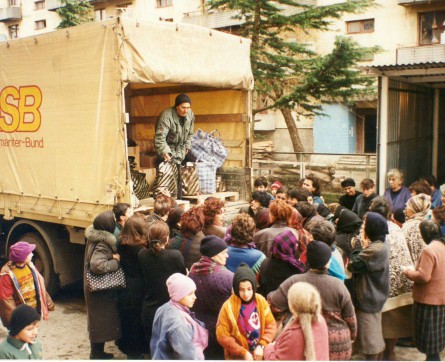
In 1992, Arbeiter-Samariter-Bund (ASB) entered Georgia as a humanitarian aid service. Along with this, ASB has been promoting the development of local agriculture by maintaining water supply/irrigation systems within the framework of several projects, in order to ensure the increase in the yield of agricultural products. Since 1997, when Georgia began to emerge from the crisis, ASB stopped direct humanitarian aid, although personal contacts and a positive image of the organization among the local population were maintained.
At the end of 2010, ASB returned to Georgia and established one of the 11 international branches of the organization, which is focused on three of the four main directions of ASB aimed at development. The directions are mainly financed from the budget of the European Union, the German government and the ASB itself. One of the main areas is the development of civil society, the promotion of private-state social partnership, the support of social enterprises and the provision of social services to the socially vulnerable, including internally displaced persons and persons with disabilities.
The second direction is aimed at increasing preparedness for natural disasters and promoting the development of an inclusive approach to disaster risk reduction (DiDDR). By strengthening local disaster risk management and increasing self-help capabilities, the defense capacity of the local population during emergency situations is strengthened.
The third direction is focused on strengthening the capacity of the Samaritan Union of Georgia (SSK) as an independent Georgian non-governmental organization, so that the organization can continue to provide services even after ASB leaves the country.
Currently, ASB is implementing projects together with various partner organizations, the purpose of which is to improve the living conditions of the population of Georgia and reduce the level of its dependence on external aid. Raising the capacity of the local population through systematic consultations, education and financial assistance. ASB's foreign aid program is funded by both the institutional and private sectors, such as the German Ministry of Foreign Affairs, the German Ministry for Economic Cooperation and Development, the European Union, the European Commission for Humanitarian Aid and Civil Defense, the Population Bureau, the Office for Displaced Persons and Migration, as well as UN organizations such as, FAO, UNHCR, UNDP, UN-OCHA, UNICEF, WFP and others.